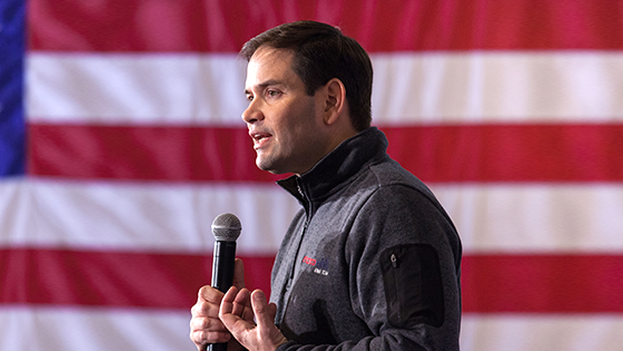
![]() 14ymedio, Pedro Campos, Havana, 16 March 2016 – In the Republican primary this Tuesday in Florida, candidate Donald Trump, who has been in favor of continuing Obama’s policy toward Cuba, defeated Cuban-American Marco Rubio by a margin of more than 20%, in the bastion of Cuban exile voters.
14ymedio, Pedro Campos, Havana, 16 March 2016 – In the Republican primary this Tuesday in Florida, candidate Donald Trump, who has been in favor of continuing Obama’s policy toward Cuba, defeated Cuban-American Marco Rubio by a margin of more than 20%, in the bastion of Cuban exile voters.
This adverse result, achieved in his home state and the headquarters of the Cuban opposition, led Senator Rubio to the decision to end his campaign to become the candidate of the Republican Party and should serve him to reevaluate any future political strategy.
A more extensive reading of the fact should lead American politicians of Cuban origin to understand that among the hundreds of thousands of nationals from the Island living in Florida, the policy Rubio defended, of pressure and an embargo on Cuba, can no longer count on majority support, as has been repeatedly pointed out by pollsters and political analysts.
Rubio had sustained his campaign in Florida opposing Obama’s policy to exchange the embargo and the pressure for rapprochement and cooperation. A part of the most radical opposition in Cuba trusted in his victory, and that once he was president of the United States he would reverse the policy of his predecessor and return to the embargo and pressure.
It is also a hard blow to internal opposition grouped who believed Rubio would win, supported him in his efforts and did and are doing everything possible to demonstrate the unworkability of Obama’s policy. They oppose his upcoming visit to Havana and with their actions have challenged the new turn in United States policy.
Rubio’s defeat in Florida is a sign that Cuban exiles have increased their support for the new policy of the United States government towards Cuba, which should contribute to a readjustment of the strategies of the most radical groups among the exile and the internal opposition and, presumably, in the position of the United States Congress towards the embargo in the coming months.
The more moderate part of the internal opposition, which for some time has assumed a different approach to that advocated by the most radical groups in Miami, is now in a better condition to advance their position in favor of dialog with Havana.
Moreover, candidates with a greater number of supports, both the Democratic and Republican Parties, favor a continuation of the new policy towards Cuba, so it becomes increasingly likely that whatever the results in the presidential elections in the US, the current trend would continue.
These considerations must help the Cuban government feel calmer about the future of its relations with the US, while the internal opposition on the island assimilates that this new relaxed atmosphere here to stay. These perspectives provide opportunities for both the government and the opposition to consider inclusive agendas that contribute to improved welfare of the Cuban people.
Some may point out that the battle for the Republican nomination is not over and that another Cuban American, Ted Cruz, who also opposes Obama’s policy, is still in the running. This is true, but in the unlikely event that Cruz beats Trump he would have to adapt his speech to the viewpoints that have marked the results in the primaries.
